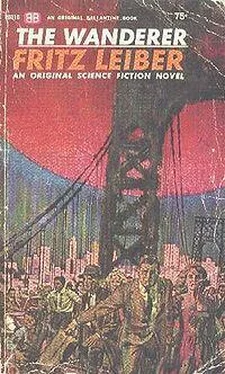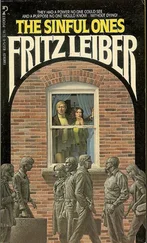“Professor Hunter!” she said. “I didn’t think you were that sort of man.”
“What sort?” he asked her, perhaps smiling, but the beard made that hard to tell.
“Why, to follow a girl when she’s on private business.”
He simply looked at her, and she smoothed her blonde hair. “Aren’t you used to the frank interest of men? Sexual or otherwise,” he asked blandly. Then, “Fact is, I thought I heard a little landslide.”
“A rock did roll down to the beach,” she said, stepping past him, “but the noise couldn’t have carried far.”
“It carried to me,” he said, starting down the ridge beside her. “Why don’t you take that jacket off? It’s getting hot”
“I could think of subtler approaches,” she told him a bit acidly.
“So could I,” he assured her.
“I guess you could,” she agreed after a moment. Then stopping at the foot of the ridge: “Ross, name a leading scientist, physicist especially, Nobel Prize caliber, who’s got real wisdom for humanity?…Moral integrity, but vision and compassion, too.”
“That’s quite a question,” he said. “Well, there’s Drummond, there’s Stendhal — though he’s hardly a physicist — and Rosenzweig…and of course there’s Morton Opperly.”
“That’s the name I wanted you to say,” she told him.
Dai Davies pounded on the frame of the diamond-paned door of the tiny pub near Portishead. His knees knocked together; his face was greenish pale; his hair, straight, plastered-down black locks; his clothes, soaking — and he would have been covered with mud from his falls except that it had been scoured off by the swim he’d had to make of the last hundred yards of his retreat back across Bristol Channel.
And he was at the very end of his ebbing, drunken strength. — if it had taken another dozen flailing overarm strokes and convulsive kicks, he’d never have made it to shore, he knew, out of the wild, foamy flood tide surging up-Severn. He needed alcohol, ethanol, spirits of wine! — as a bleeding man in shock needs a transfusion.
Yet for some reason the filthy Somersets had locked the door and hidden themselves — doubtless simply to thwart him, out of pure, mean, Welsh-hating, poet-despising cruelty, for these were open hours. By suffering Christ, he’d have the law on them for locking the place! He pressed his face to the lead-netted small panes to spy them out in their cowardly holes, but the shadowy taproom was empty, the lights were all out.
He reeled back, beating his arms across his chest for warmth, and hoarsely screeched up and down the road: “Where are you all? Come out! Come out, somebody!” But not a soul showed himself, not a single house door opened, not even one loveless white she-face peered out a window. He was all alone.
He went trembling back to the pub door, grabbed the frame with both hands to steady himself, managed to lift a cramped leg, and kicked a short, convulsive kick with his heel. Three panes cracked and fell inside. He got his leg down, then he crouched against the door and thrust his arm through to the shoulder and reached around, found the lock, and worked it. The door opened, and he stumbled inside, retrieving his arm from the glass-jagged leaden web, then took four steps toward the bar, and stood wavering in the middle of the room, almost fainting.
And then as he swayed there gasping, and his eyes got used to the dimness, a wonderful change came over him and filled him brimful. Suddenly it was the finest thing in the world that he should be all alone at this moment; it was the fulfillment of an old, old dream.
He did not mind the faint roar behind him or glance once over his shoulder through the broken door at the Bristol Channel filling in dirty, low, foam-edged, flotsam-studded steps. He had eyes only for the amber and greenish, charmingly labeled bottles ranged on the shelves behind the bar. They were like treasured books to him, founts of all wisdom, friends of the lonely, a lovely library to be forever sampled and savored and of which he could never tire.
And as he approached them with loving deliberation, smiling a wide smile, he began softly and liltingly to read their titles from their spines:
“Old Smuggler …by Richard Blackmore. Teachers, by C. P. Snow. The Black and the White, by Stendhal. White Horse, by G. K. Chesterton…”
General Spike Stevens sloshed through cold salt water past the elevator shaft from which the water was welling more strongly every moment, making the metal door groan. A flashlamp strapped to his chest shone on the thigh-deep water and on a wall papered with historic battle scenes. Three more flashlamps came up behind him “…like we were a bunch of damn musical comedy burglars,” Colonel Griswold had put it.
The general felt around the wall, dug his fingers through the paper, and jerked open — the paper tearing — a light, two-foot-square door, revealing a shallow recess with nothing but a big black lever-handle in it.
He faced the others. “Understand,” he said rapidly, “I only know the entrance to the escape shaft. I don’t know where it comes out any more than you do, because I’m not supposed to know where we are — and I don’t. We’ll hope it leads up into some sort of tower, because we know we’re about two hundred feet below ground and that somehow there’s some salt water up there. Understand? Okay, I’m going to open it.”
He turned and dragged down on the lever. Colonel Mabel Wallingford was standing just behind him, Colonel Griswold and Captain Kidley a few feet back.
The lever budged a quarter inch and stuck. He dragged down on it with both hands until he was only knee-deep in the water. Colonel Mab reached up and put her hands beside his and chinned herself.
Griswold called: “Wait! If it’s jammed, it means—”
The lever dropped eight inches. Three feet away, wallpaper tore along a right angle as a door two feet wide and five feet high opened, and a black bolster of water came out and bowled over Captain Kidley and Colonel Griswold — Colonel Mab saw the tatter’s lamp pushed deeper and deeper.
The solid water kept coming, a great thick ridge of it. It grabbed at the feet of Colonel Mab and the general. They clung to the lever.
Margo and Clarence Dodd were leaning their elbows on the upper rail of the concrete bridge, looking at the hills and speculating about the ceiling of diluted smoke that was moving up from the south and turning the sun red, giving its light an ominous brassy cast. She’d come here chiefly to get away from Ross Hunter.
“It could be only brush fires in the canyons and mountains,” the Little Man said. “But I’m afraid it’s more than that, Miss Gelhorn. You live in Los Angeles?”
“I rent a cottage in Santa Monica. Same thing.”
“Any family there?”
“No, just myself.”
“That’s good, at least. I’m afraid, unless we get rain—”
“Look,” she said, glancing down. “There’s water in the wash now! Doesn’t that mean there’s rain inland?”
But just then, with a triumphant tooting of horns, Hixon’s truck came rolling back from a reconnoiter down the coast, followed by a short, blocky yellow school bus. The two vehicles stopped on the bridge. Wojtowicz climbed down from the bus. He was carrying one of the army rifles. Doc came after him, but stopped on the step-down platform, which made a convenient rostrum.
“I am pleased to announce that I’ve found us transportation,” he called out loudly and jovially. “I insisted on looking into Monica Mountainway, and there, in a little vale not one hundred yards off the highway, I discovered this charming bus waiting to begin its morning chore, which today will be carrying us! It’s all gassed up and plentifully stocked with peanut butter and jelly sandwiches and irradiated, fluoridated milk. Prepare for departure in five minutes, everyone!” He stepped down and came swinging around the yellow hood. “Doddsy, that’s not rainwater in that wash there, that’s salt tide — just look over the other side of the bridge and you’ll see it stretching out in one gleaming sheet to China. Times like this, things creep up on people. You’ve got the other gun, Doddsy — you ride with the Hixons. Ida will be with you to nurse Ray Hanks. I’ll command the bus.”
Читать дальше










